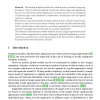Free Online Productivity Tools
i2Speak
i2Symbol
i2OCR
iTex2Img
iWeb2Print
iWeb2Shot
i2Type
iPdf2Split
iPdf2Merge
i2Bopomofo
i2Arabic
i2Style
i2Image
i2PDF
iLatex2Rtf
Sci2ools
106
click to vote
MICCAI
2004
Springer
2004
Springer
Shape Particle Filtering for Image Segmentation
Abstract. Deformable template models are valuable tools in medical image segmentation. Current methods elegantly incorporate global shape and appearance, but can not cope with localized appearance variations and rely on an assumption of Gaussian gray value distribution. Furthermore, initialization near the optimal solution is required. We propose a maximum likelihood shape inference that is based on pixel classification, so that local and non-linear intensity variations are dealt with naturally, while a global shape model ensures a consistent segmentation. Optimization by stochastic sampling removes the need for accurate initialization. The method is demonstrated on three different medical image segmentation problems: vertebra segmentation in spine radiographs, lung field segmentation in thorax X rays, and delineation of the myocardium of the left ventricle in MRI slices. Accurate results were obtained in all tasks.
Consistent Segmentation | Image Segmentation Problems | Medical Image Segmentation | Medical Imaging | MICCAI 2004 |
Related Content
| Added | 15 Nov 2009 |
| Updated | 15 Nov 2009 |
| Type | Conference |
| Year | 2004 |
| Where | MICCAI |
| Authors | Marleen de Bruijne, Mads Nielsen |
Comments (0)

